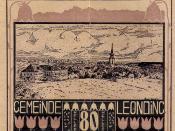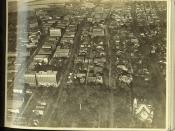Whether or not the term 'Roaring Twenties' is an adequate description of the character of Australian society from 1920 to 1929 depends on the circumstances of the Australian population in this decade, because 'Roaring' implies the 1920's were full of dramatic social changes, which may have came about from spontaneous economical or political incidences and new inventions. In the 1920s Australian politics was dominated by the conservative parties and, despite some industrial discontent and hardship, the economy was prosperous and expanding. Australian society was experiencing changes and new developments in many fields. The use of electricity during the twenties became much more common, and it dramatically altered the lives of people living in the cities and towns. With the value of leisure activities having increased since pre-war days, Australians indulged in the radio, pictures, dance halls and sport. Women of the 1920s experienced all new liberties with a dramatic diminish in their sense of modesty compared to pre-war days.
The development of transport in the 1920s includes motor cars, which were improved and mass produced, and the importance of public transport. The 1920s saw important developments in Australian agriculture as expansion took place in many different sectors of farming. Despite these factors from which Australians benefited in the 1920s, the term 'Roaring Twenties' may seem superficial as a description of the character of Australian society in this decade because there was continuous industrial conflict. Long and sometimes violent strikes were frequently experienced in the industrial sectors, with over one million working days being lost each year of the decade. The common belief in the late 19th century was that Aborigines were a dying race, so it does not come as a surprise that they did not benefit from the twenties as much as main stream society. These are...


